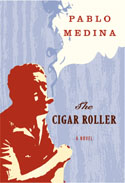- Categories:
Book Sense Notable Is a Novel of Reverie & Remembrance
 Pablo Medina |
When Pablo Medina initially conceived his latest novel, The Cigar Roller (Grove Press), a May Book Sense Notable, he envisioned a social history of the cigar industry and the cigar-worker community -- made up of many Cuban immigrants -- in and around Tampa, Florida. "But then again, I'm neither a sociologist nor an historian," the Cuban-born author said in a recent interview with BTW, so he jettisoned that idea and pursued an historical novel. The decision wasn't surprising, considering his two previous novels, The Return of Felix Nogara and The Marks of Birth, are both "historically influenced or driven." In writing Nogara, in fact, Medina felt as if "history itself was becoming a character in the narrative," he said. "The main character in that book was constantly reacting to history and historical events surrounding him."
As Medina continued to write The Cigar Roller, he would focus on one character more than anyone or anything else. "The whole idea of an historical novel fell by the wayside, and I decided to write a short novel" -- only 178 pages, in fact -- "on this particular character." In hindsight, he added, "It had become a process of discovering what it was that the novel wanted to be."

Early in the book, Medina -- who is also the author of five collections of poetry and a memoir -- blends Amadeo's physical and emotional turmoil with memories of urban strife, all in one poetic, metaphorically rich passage. He writes: "Something is happening inside his body he doesn't like, groups of people gathering on street corners, in parks, upset at some political unfairness, a stolen election, a breakdown of the system. More people gather and the outrage grows, followed by a rallying cry. The crowd spills onto the street. A boy throws a Molotov cocktail at a police wagon; someone else sets fire to a mound of refuse.... Amadeo opens his mouth to scream for help and a fierce jet of food shoots out and lands on the white snow of his belly."
Perhaps the description of Amadeo's belly was inspired, in part, by the location where Medina wrote most of this novel: the top of a peak in the White Mountains of New Hampshire. "I was living by myself and when the snows started coming and the darkness arrived and the bitterly cold weather began, the only companionship I had on a day-to-day basis was Amadeo," Medina recalled. "So that many of the issues that I myself struggled with -- with what it means to be a man and how it is that one acts in the world, for example -- I sort of projected onto this character and tried to deal with in that way. I almost went crazy up there but at least I got this book out of it."
As Medina's mountain-top writing sojourn ensued, he strove to make Amadeo, well, as flawed as possible, he confessed. "He's a man who really has not looked at his own self and that comes up in the way he relates to others," the author said. "And he's constantly acting out of some rather narrow perspectives that he carries with him. I like to believe the book itself is the process of him discovering, on some level, those flaws and finally coming to terms with them." In short, Amadeo is not an easy character to like, Medina admitted. "The way he dealt with his wife and children were not always the most uplifting ways," he said. Yet the author ultimately presents Amadeo as someone who, in many ways, is easy to relate to and who is undeniably human -- comically so, at times. "He's comic in that he comes to an understanding of himself that he has avoided for so long," Medina explained. "Amadeo sees that what he's been searching for is a way of reaching other people."
While concocting Amadeo, Medina looked to both fictional characters, including Pedro Paramo in Juan Rulfo's novel of the same name, and real-life individuals. "I had a couple of relatives who had suffered strokes around the time I was working on this whole project, so I became very familiar with nursing homes and the way caretakers interact with patients, and vice versa." Still, those who interact with Amadeo aren't nearly as developed as Medina's protagonist. "It's one of the things you negotiate as a writer," Medina said. "I couldn't have such an internally based story, and at the same time, have several fully formed secondary characters. Yet I think some of them are fuller than others. His wife, Julia, is certainly more developed; but because we see them through his eyes only, they all sort of flatten out."
Medina was born in Cuba and lived there for 12 years before moving to New York City in 1960. "Since I arrived in the U.S., I've always been searching for points of contact regarding the two cultures," he said. "And it was certainly a way into this novel."
Medina -- who has been teaching writing and literature at New School University in Manhattan during the past decade -- has only been back to Cuba once, in 1999, and that visit was a complicated experience. "I was only there for nine days, and I was numb for most of the time," he remembered. "I was trying to get my bearings straight. I felt very much a stranger, but at the same time I felt I belonged in some strange way. Both emotions were struggling with one another. When I first left the island, the city of Havana was essentially intact. But when I was there in '99, it was completely deteriorated to the point where I felt as if I was walking around among ruins, essentially the ruins of my memory. I'm still, in ways, trying to deal with that." --Jeff Perlah

